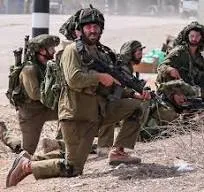Unveiling the Might of the Israeli Military: A Closer Look at Its Strengths and Strategies
The Israeli military, known as the Israel Defense Forces (IDF), stands as a formidable force in the Middle East. Formed shortly after the establishment of the State of Israel in 1948, the IDF has evolved into one of the most advanced and proficient militaries in the world. Its history is deeply intertwined with the complex geopolitical landscape of the region, marked by numerous conflicts and security challenges. In this article, we will delve into the strengths, strategies, and technological advancements that characterize the Israeli military.
Historical Context
To understand the Israeli military's development, it's essential to consider the historical context. Israel's very existence has been challenged since its inception, facing wars and conflicts with neighboring Arab states. The Arab-Israeli conflicts, particularly the 1948 Arab-Israeli War, the Six-Day War in 1967, and the Yom Kippur War in 1973, shaped the IDF's doctrine and operational strategies.
Strengths of the Israeli Military
Highly Trained Personnel: The IDF boasts a well-trained and motivated force, comprising conscripts and reservists. Conscription is mandatory for Israeli citizens over 18, resulting in a large pool of skilled manpower.
Advanced Technology: Israel has a thriving defense industry, producing cutting-edge military technology. From drones and cyber warfare capabilities to missile defense systems like Iron Dome, Israel's technological prowess is renowned globally.
Adaptive Doctrine: The IDF continually adapts its doctrine and strategies to address evolving threats. Its military doctrine emphasizes agility, intelligence, and preemption, aiming to neutralize threats before they materialize.
Strategic Alliances: Israel benefits from strategic alliances, particularly with the United States. This partnership provides Israel with access to advanced weaponry, intelligence sharing, and diplomatic support.
Mossad and Intelligence: Mossad, Israel's intelligence agency, plays a crucial role in gathering actionable intelligence and conducting covert operations to safeguard Israeli interests.
Operational Strategies
Preemptive Strikes: Israel adopts a proactive approach to security, often conducting preemptive strikes to prevent imminent threats. This strategy was evident in operations like the 1981 bombing of the Osirak nuclear reactor in Iraq and the 2007 airstrike on a suspected Syrian nuclear facility.
Defense in Depth: Given its small geographical size and proximity to hostile neighbors, Israel focuses on defense in depth, deploying layered defense mechanisms to thwart potential threats.
Asymmetric Warfare: Facing adversaries with larger populations and conventional forces, Israel employs asymmetric warfare tactics, leveraging its technological superiority and intelligence capabilities to offset numerical disadvantages.
Deterrence: The IDF maintains a robust deterrence posture, signaling its readiness to respond forcefully to any aggression. This deterrence strategy aims to dissuade adversaries from initiating hostilities.
Challenges and Controversies
Despite its strengths, the Israeli military faces several challenges and controversies. The Israeli-Palestinian conflict remains a persistent source of instability, with recurring bouts of violence in the Gaza Strip and the West Bank. The use of force, especially in densely populated civilian areas, often leads to international condemnation and accusations of human rights violations.Moreover, Israel's military actions in the region have sparked geopolitical tensions, particularly with Iran and its proxies. The threat of regional conflicts, coupled with the proliferation of non-state actors like Hezbollah and Hamas, poses complex security dilemmas for the IDF.
The Israeli military's strength lies not only in its advanced technology and well-trained personnel but also in its ability to adapt to dynamic security challenges. Through a combination of strategic alliances, innovative tactics, and a proactive approach to security, the IDF continues to safeguard Israel's sovereignty and national interests in a volatile region. However, achieving lasting peace and stability remains elusive, highlighting the need for diplomatic efforts alongside military capabilities to address the root causes of conflict in the Middle East.





